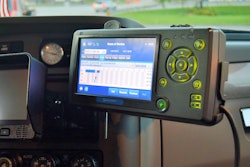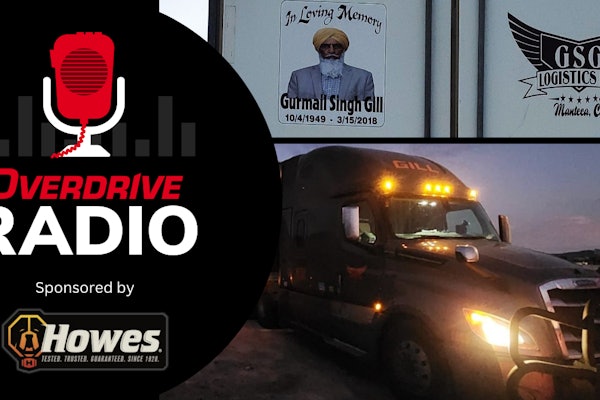
As expected, the Owner-Operator Independent Driver’s Association has filed initial arguments in its challenge to the Federal Motor Carrier Safety Administration’s electronic logging device (ELD) mandate final rule. The association argued in its appeal of the ELD mandate that requiring electronic monitoring devices on commercial vehicles does not advance safety, is arbitrary and capricious and violates Fourth Amendment protections against unreasonable searches and seizures.
OOIDA filed the legal brief with the U.S. Court of Appeals for the 7th Circuit, the same court that in 2011 vacated FMCSA’s prior rule related to electronic logs, a limited mandate for certain noncompliant carriers. OOIDA led that challenge as well.
“The agency provided no proof of their claims that [the current ELD mandate] would improve highway safety. They didn’t even attempt to compare the safety records of trucking companies that use ELDs and those that do not,” said Jim Johnston, OOIDA President and CEO.
Download OOIDA’s full court briefing via this link.
FMCSA Spokesman Duane DeBruyne declined to comment on the court proceedings, but in the text of the ELD final rule, issued last December, the agency outlined its approach to evaluating the safety benefits of the use of ELDs for hours of service compliance. FMCSA used its “peer-reviewed Roadside Intervention Model” to estimate crash reductions among carriers using ELDs, it says.
And generally, the agency notes, “ELDs bring about improvements in safety by making it difficult for drivers and carriers to falsify drivers’ duty status, which in turn deters violations of the HOS (hours of service) rules. And increased compliance with the HOS rules will reduce the risks of fatigue-related crashes attributable, in whole or in part, to patterns of violations of the HOS rules.”
Overdrive has shown that a sizable majority of the estimated benefit that FMCSA noted in its required Regulatory Impact Analysis (which showed a net benefit of the rule) came not from estimated crash reductions, however, but from monetary values placed on driver time and paperwork savings.
Johnston and OOIDA are unconvinced by FMCSA’s safety-improvement analysis, in the end. “There is simply no proof that the costs, burdens and privacy infringements associated with this mandate are justified,” Johnston said, advancing a common argument against ELDs in noting that “a truck is not just a vehicle but is also an office and a home away from home. This mandate means monitoring the movement and activities of real people for law enforcement purposes and is an outrageous intrusion of the privacy of professional truckers.”
For the purposes of the Fourth Amendment, the Supreme Court has previously ruled in favor of some intrusions into the business of commercial transportation operators in, famously, the case involving a drug-testing program decided in 1989 that argued a public “special need” in balancing concerns for safety versus the privacy rights of rail engineers. Programmatic drug- and alcohol-testing requirements followed for commercial truck operators in the 1990s.
Truckers Justice Center attorney Paul Taylor, interviewed for Part 2 in Overdrive‘s Tomorrow’s Trucker series (due shortly in the April issue), noted that case, Skinner v. Railway Labor Executives Association, in his “general impression … sort of threw privacy out the window for truck drivers,” he says, from a legal perspective. (Taylor notes he personally disagreed with the decision.)
The testing program was found to not violate the Fourth Amendment to the Constitution, which protects the “right of the people to be secure in their persons, houses, papers, and effects” and prohibits “unreasonable searches and seizures.”
In the case, drug/alcohol testing constituted a clear search of your person but not your home. Taylor explains, “The court said, ‘this is a commercial vehicle, not a home.’” As regards the search of the operator’s person, “‘This is something in the stream of commerce,’” Taylor paraphrases. The argument against a fourth-amendment violation “balances safety versus due process,” and “the court did find the searches were not unreasonable.”
Find our full ELD-related coverage via this link.
But drug tests are not ELDs, and OOIDA argues that other Supreme Court decisions, incluing the 2015 Torrey Dale Grady v. North Carolina, affirm that prolonged use of a warrantless GPS tracking device on a vehicle is clearly an unreasonable search/seizure within the meaning of the Fourth Amendment.
OOIDA said that FMCSA’s attempt to compel installation of ELD devices without a warrant is an unconstitutional seizure.
OOIDA also listed other arguments in the legal brief requesting the court to vacate the rule:
- That the mandate fails to comply with a congressional statute requiring ELDs to accurately and automatically record changes in drivers’ duty status. ELDs can only track vehicle movement and must rely on drivers to manually input changes in duty status, making the devices “no more reliable than paper logbooks for recording hours of service compliance,” OOIDA says.
- That the current mandate continues to fail to ensure that ELDs will not be used to harass drivers — FMCSA’s own failure to provide for this requirement of existing law was the reason the 7th Circuit vacated the prior e-logs rule in 2011. FMCSA responded to such requirements by in part developing the parallel Driver Coercion rule and opening up new whistleblower architecture for driver complaints, penalties for violating carriers.











